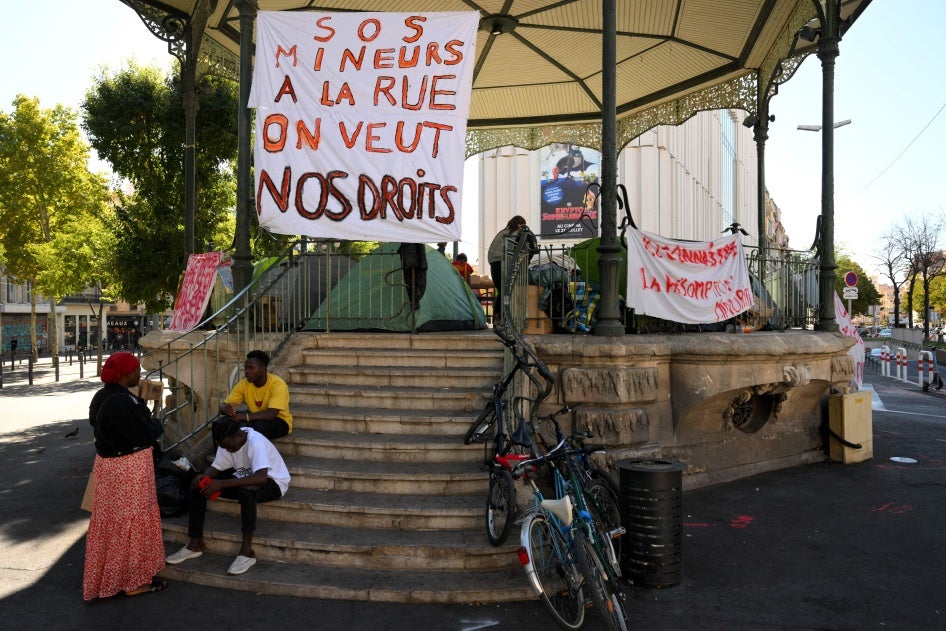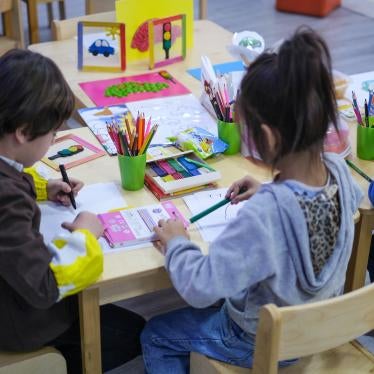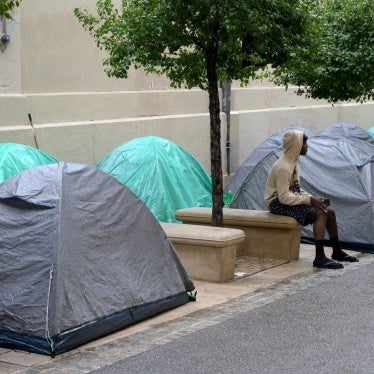- Unaccompanied migrant children arriving in Marseille undergo arbitrary age assessments, leading to denial of their rights to housing, health, and education.
- One in two are initially denied recognition of minority, but nearly three-quarters of those who appeal ultimately establish that they are under 18.
- French officials need to ensure that children are not homeless, that their health needs are met, and that they can access education while they exercise their right to review negative age assessments.
(Paris) – The French department of Bouches-du-Rhône, which includes Marseille, France’s second-largest city, is failing to provide unaccompanied migrant children the protections they need and to which they are entitled, Human Rights Watch said in a report released today.
The 70-page report, “‘Not the France I Imagined’: Housing, Health, and Education for Unaccompanied Migrant Children in Marseille,” finds that Marseille’s child protection authorities are leaving children with health needs on the street without treatment, psychosocial support, or follow-up care. Half of unaccompanied migrant children who face an age assessment in Marseille are denied formal recognition as a child, yet those decisions are overturned for nearly 75 percent of those who file an appeal. Review by the courts can take months or even years, leaving children ineligible for emergency accommodation and services such as legal assistance, the appointment of a guardian, universal health protection, and education.
“No child should be forced to sleep in the streets while their long-term eligibility for services is resolved,” said Michael Garcia Bochenek, senior children’s rights counsel at Human Rights Watch. “It’s especially shameful to subject young people to this uncertainty and insecurity when the overwhelming majority of those who appeal adverse age assessments are ultimately successful.”
Human Rights Watch interviewed nearly 60 people, including 18 unaccompanied children as well as staff of humanitarian agencies, lawyers, health care providers, including pediatricians, other doctors, social workers, and child psychologists, experts, local authority workers, and volunteers who assist with housing and legal proceedings, or run activities for young migrants and asylum seekers in Marseille.
Children said they were turned away from emergency accommodation because facilities were at capacity, requiring them to wait for weeks for a spot. Children erroneously found to be adults described having nowhere to sleep after being evicted from emergency accommodation following an adverse age determination.
A doctor treating unaccompanied children in Marseille said that children who reach France in many cases are already exhausted, and that “precarious living conditions [on arrival] are dangerous for the physical integrity of unaccompanied minors and sometimes lead to hospitalizations lasting several days, which could be avoided.”
The department of Bouches-du-Rhône is responsible for performing an initial health screening while children await age assessments. Human Rights Watch found that these screenings are not performed systematically. Even when they are, an initial negative age assessment often means that children are left to fend for themselves in vulnerable states of physical and mental health. In some cases, children slept on the street for days or weeks with tuberculosis, HIV, post-traumatic stress, or undetected pregnancies until their age assessment appeals were successful.
Social workers, psychologists, and doctors treating unaccompanied migrant children in Marseille reported a high incidence of symptoms consistent with post-traumatic stress, intrusive thoughts, sleep disorders, depression, and anxiety. Navigating the complexities of the French system is also especially bewildering for children and weighs on their mental health.
Despite guarantees under the law, unaccompanied children in Marseille who are not initially recognized as children lose on average six months of schooling, jeopardizing their chances of obtaining legal status once they turn 18.
A controversial new immigration bill adopted in December 2023 threatened to roll back many protections for asylum seekers and migrants, although the Constitutional Council, which reviews the constitutionality of legislation, rejected some of its most harsh provisions, largely on procedural grounds. It was not immediately clear how the remaining provisions of the bill would affect unaccompanied young migrants who have received a negative initial age assessment and are seeking review of their cases by the juvenile judge.
France has an obligation to ensure the basic needs of all people in its territory, and provide adequate care, assistance, and protection to all children, regardless of migration status.
“Authorities in Marseille and elsewhere in France should act decisively to give children the services they need to be safe and to thrive,” Bochenek said.
Selected case studies:
Loss of mobility due to untreated tuberculosis
R., a teenage boy from West Africa, arrived at the departmental evaluation service in February 2021. While housed in temporary emergency accommodation awaiting an age assessment, he was taken to the national tuberculosis control center (CLAT) for a health screening and was diagnosed with tuberculosis. CLAT shared the diagnostics with the departmental evaluation service and requested that R. return to their facilities to be treated. Despite numerous reminders to the department over several months, R. was never redirected to receive treatment.
In April 2021, three months after the diagnosis, R. received a negative age assessment and was returned to the streets without any anti-tuberculosis treatment or follow-up care. In November 2021, R. abruptly lost sensation in both of his legs. When he went to the hospital, doctors discovered that tuberculosis had spread to his bones and spinal cord. Doctors performed an emergency arthrodesis—a joint fusion—and inserted metal plates in his vertebrae. A volunteer told Human Rights Watch: “He lost 60 percent of his mobility, and there are movements he will never simply be able to do again.”
The Médecins sans Frontières (MSF) nurse who handled R.’s follow-up care said that had action been taken 10 months earlier when he had his initial tuberculosis screening, complications could have been avoided: “If they had treated the tuberculosis when it was diagnosed, he would maybe not have lost his mobility... the fact that the department didn’t warn anyone about his condition is unacceptable.” In May 2023, R. continued to experience severe physical pain and difficulty climbing the stairs.
Undetected pregnancy
A., a teenage girl originally from West Africa, fled a forced marriage in her country and experienced sexual violence on the journey through Tunisia. Upon arriving in Marseille, she slept at the railway station until she was granted temporary emergency accommodation by a departmental service that houses children in critical or vulnerable situations.
Three weeks into her temporary emergency accommodation period, she still hadn’t undergone an initial health assessment and received a negative age assessment. When she felt ill, a volunteer suggested she visit Le Comede, an association providing health services to migrants and asylum seekers in Marseille. Her medical exam there showed that she was 11 weeks pregnant. Sabine Allier, the social worker who accompanied the girl to the hospital for an abortion, said that doctors expressed confusion and suspicion due to the inconsistency between the date of birth on her identity documents and the paperwork from the department rejecting her age:
For any young girl, an abortion is already difficult, but when added to that you experience suspicion, it turns into an extremely violent moment. A bit of softness would help. The violence these kids face is from multiple sources.
Untreated tuberculosis and hepatitis B
E., a teenage boy from West Africa, arrived in Marseille in 2021. After two months on a waiting list for a spot in temporary emergency accommodation, he was finally taken in by the departmental evaluation service and underwent an initial health screening. E. was diagnosed with latent tuberculosis and hepatitis B, yet he received no treatment while housed by the department. After receiving a negative age assessment, he was put on the street without any rights to health care or any guidance regarding a treatment plan. It was only months later when MSF staff found E. that they discovered he had already been screened by the department and was carrying infectious diseases without any treatment.
A doctor who treated E. at a health center run by an association said:
He had quite disturbing numbers on his labs, liver pain, a very high viral load…and he was completely in the wild, with no health insurance, nothing. It’s a miracle he came to see us. His liver was on the verge of shutting down. When you see a boy sleeping on the street—which we already know is harmful to vital health needs—with no access to care, and in the process of clearly destroying his health, and the department knew about it the whole time and did nothing … as a doctor, that truly traumatized me.








